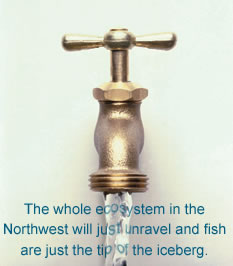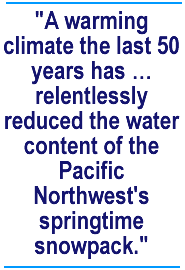
Engineering Professor Dennis Lettenmaier says climate change in the next 50 years is probably going to result in the grim regional choice of salmon or hydropower, but not both.
Adding to the coming crisis is the growing tension between Eastsiders and Westsiders in Washington and Oregon. The two groups already point fingers at each other-those "206ers" being among the dismissive terms Eastsiders have for the urbanites in Seattle's area code, while some Westsiders are just as quick to dismiss a 60-year tradition of irrigated farming.
When talking about water scarcity, what's particularly perplexing is that the region may actually have heavier overall annual river flows because of climate change, according to Civil and Environmental Engineering Professor Richard Palmer. The problem for a warmer and wetter Pacific Northwest is the timing of precipitation-how much falls as rain instead of snow and how long the snow pack lasts into the summer, Palmer says.

Seeing as how we're already extracting the maximum amount of water possible, Palmer says, the cumulative effect of climate change shifting summer flows to earlier in the year could mean 30 percent less water right when we need it the most. "That's our biggest challenge in my opinion."
He points to the Sultan River, which fills Everett's Spada Reservoir, as an example. According to one scientific model, climate change will mean more winter precipitation falling as rain rather than snow. The resulting snowpack will be smaller and could melt toward the end of winter rather than in June and July, as it typically does now. Compared to today, flows could be cut 33 to 48 percent during May through September when demand is high.
Beyond human uses, lower stream flows in the summer mean less habitat and higher stream temperatures for fish and other aquatic organisms. This could play havoc with their physiology and even their ability to survive.
Ironically, the greater amount of rainfall and earlier runoffs means we also can expect higher than usual river flows in late winter and spring. In the face of the resulting flooding, the U.S. Army Corps of Engineers and others will likely be under pressure to pull down reservoirs even though that water will be much needed later in the year, Palmer says.

So what's the answer? Our Depression-era engineers would have built more dams to increase the capacity of current reservoirs or create new ones. Today there is also talk of pumping water from aquifers like the one beneath the Rathdum Prairie near Spokane that has Washington and Idaho wrestling over its control. The Puget Sound region might also find a new supply from an aquifer that appears to sit under North Bend.
But Jim Karr, UW professor of fisheries and public affairs, warns of trying to narrowly focus and engineer our way out of very complex challenges.
"I'm concerned that the issue will be seen as one that is about water, the H2O, the fluid," he says. "That perspective doesn't see the connection to the broader context of water and associated resources. It does not see the fish. It doesn't see the broader biology of our freshwater systems.
"Moreover, it does not see the profound importance of water and the flow of water to coastal environments, the areas of salt water that do not provide drinking water but that do provide a vast array of other goods and services crucial to the success of our region.
"Second, I worry that we will forget that it is not water that we depend upon but the water cycle," Karr says. As part of that cycle, water evaporating from oceans and waterways becomes clouds laden with rain and snow that falls, percolating into the soil, being taken up by plants, filling rivers, streams and lakes or remaining for long periods of time as snow and ice in some areas.
Go To: Page 1 | Page 2 | Page 3
- Return to June 2003 Table of Contents